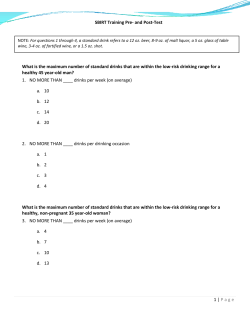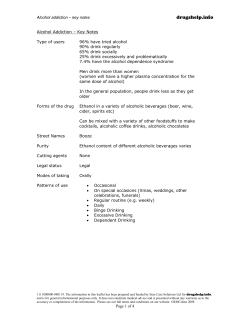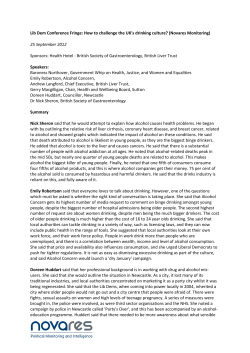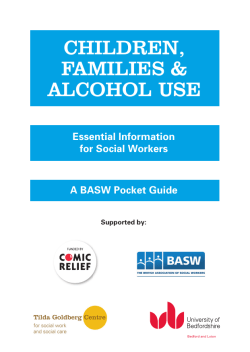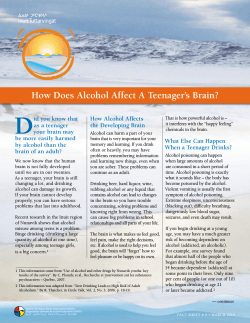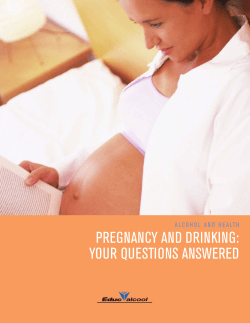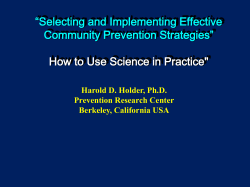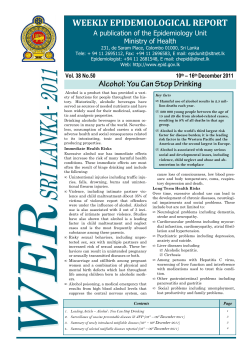
Teenagers, alcohol and other drugs: How much influence do
Teenagers, alcohol and other drugs: How much influence do parents really have? Paul Dillon Drug and Alcohol Research and Training Australia Outline of presentation Australian illicit drug use – 2013 NDHS, 2011 ASSAD Australian adults and alcohol – what's the story? what about young people? why shouldn't young people be drinking? what influence can a parent have in preventing early drinking? so what should parents be doing? three parenting tips that prevent or delay early drinking and illicit drug use Australian drug use Are we using more illicit drugs now than in the past? Lifetime illicit drug use (%) - 14 years and over 2013 National Drug Household Survey (AIHW, 2014) % Never used illicit drugs (%) - 14 years and over 2013 National Drug Household Survey (AIHW, 2014) % 1991-2013: Changes in 'recent use' (%) 2013 National Drug Household Survey (AIHW, 2014) % What about young people? How many school-based young people have ever used drugs? Prevalence (%) of lifetime drug use (excluding tobacco, and alcohol) among 12-17 year old students 2011 ASSAD Survey (White & Bariola, 2011) % Apart from a small number of substances, drug use is uncommon amongst this group. Analgesics continue to be widely used across all ages, with inhalants being favoured by younger groups and tranquilisers more popular with the older students. Cannabis use had risen from 2008 from 13.6% to 14.8% in this survey Prevalence (%) of 12-17 year old students who have never drugs (excluding tobacco and alcohol) 2011 ASSAD Survey (White & Bariola, 2011) % Prevalence (%) of last year drug use among 12-17 year old students, 1996-2011 2011 ASSAD Survey (White & Bariola, 2011) % Overall, the story is a positive one. Once again, most secondary school students do not use drugs. However, this is the first time that cannabis use has not decreased and hallucinogens are now the second most popular drugs amongst this population Alcohol What is happening in Australia? Are we drinking more than in the past? Apparent consumption of pure alcohol, beverage type as a proportion of all alcohol, 1962-2012 ABS 2013 litres What Australians are drinking has changed substantially since the early 60s. Beer consumption has decreased dramatically, while wine and spirits account for a much greater proportion of all alcohol consumed Apparent consumption of pure alcohol, per capita, 1962-2012 ABS 2013 litres Apparent consumption of pure alcohol per capita has fluctuated over the past 50 years, hitting a peak in the late 70s. We're drinking less but our drinking patterns have changed So what is happening? Unfortunately it is how we drink when we do that appears to be the problem – when we drink, we drink a lot (usually quickly, over a short period of time) – we are a nation of binge drinkers When we drink less, alcohol companies profits drop – aggressive marketing and great resistance to restrictions on advertising and sponsorship regulations Alcohol How about school-based young people? Is it getting worse? Never consumed alcohol, Australian secondary school students (%), 2011 2011 ASSAD Survey (White & Bariola, 2011) % The majority of young people across all age groups have tried alcohol, with use increasing as they get older. That said, it is important to remember that almost one in five Year 10 students have never consumed alcohol Australian secondary school students who describe themselves as non-drinkers (%), 2011 2011 ASSAD Survey (White & Bariola, 2011) % Even though many of them have tried alcohol, the vast majority of them still regard themselves as 'non-drinkers' until they reach 16 years of age Drinking status by school year Gilligan, Kypri, Johnson, Lynagh & Love, 2012 % Respondents were classified as 'non-drinkers' (never had a glass of alcohol), 'moderate drinkers' (had a full glass but not more than four drinks on a single occasions in the last month) or 'risky drinkers' (had more than four drinks on one or more occasions in the last month). Although there are more small numbers of 'risky drinkers' in Years 8 and 9, it is Year 10 where things begin to change Average number of drinks consumed by current drinkers in past seven days, by age and gender, 2011 2011 ASSAD Survey (White & Bariola, 2011) Number of drinks Unfortunately 'current drinkers' consumed a lot of alcohol. Across all ages, average drinking levels reported exceeded recommended levels for adults. Why shouldn't young people be drinking? Growing evidence that we should be delaying alcohol use for as long as possible – key concerns … the developing brain increased risk of liver disease increased cancer risk, particularly breast cancer in young women the earlier you drink, the greater risk of future alcohol problems, including dependency more likely to be sexually active at earlier ages, to have sexual intercourse more often, and to have unprotected sex more likely to be victims of violent crime, including rape, aggravated assault, and robbery Alcohol What is the impact on the developing brain? Alcohol and the developing brain Alcohol damages two areas of the brain that undergo major changes in adolescence the hippocampus deals with memory and learning - suffers the worst damage. Those who drink more and for longer have significantly smaller hippocampi (up to 10% smaller) the prefrontal area undergoes most change during adolescence - teen drinking could cause severe changes, affecting the formation of adult personality and behaviour If a young person is going to drink alcohol at this time - make sure it is a small amount and that they do not drink regularly. However, the evidence clearly indicates that they should not drink at all Alcohol and the developing brain These brain scans show the possible impact that alcohol can have on the adolescent brain the first shows a 15 year-old non-drinker the pink and orange indicates healthy activity, particularly in the prefrontal area and the hippocampus the bottom one shows a 15 year-old heavy drinker - an unhealthy brain with little or no activity in the key areas Can you make a difference? Parents can have a major impact … promote positive norms – the majority of 15 year-olds classify themselves as non-drinkers, most young people don't use illicit drugs challenge misconceptions – 'not everyone does it', alcohol is a drug and it is possible to celebrate without it, drugs aren't 'everywhere' make your views about teen alcohol and other drug use clear – if you don't support teen drinking say so and your reasons for this stand role-modelling – both positive and negative effects parenting style – what type are you? Parenting style What type of parent are you and what do we know about the influence of particular parenting styles? Parenting styles Different types of parenting styles have been identified: authoritarian (strictness but not warmth) authoritative (warmth and strictness) indulgent (warmth but not strictness) neglectful (neither warmth nor strictness) Authoritative parenting Woulfe, C. in 'The Listener' (2014) "The single most important thing parents can do to raise healthy, happy and successful kids is to practice authoritative parenting" Laurence Steinberg in 'Age of Opportunity' Steinberg says it's crucial that parents excel in three areas: be warm – "you can't spoil a child with love" – you want to build your child's sense of feeling loved, valued and protected be firm – "set rules that are grounded in logic and purpose" and make adjustments as they get older and reward good behaviour be supportive – "gradually relinquish control and try to permit – rather than protect – when you can". If you decide to say 'no', explain why Teenage parties and alcohol Should you let your child go to teenage parties? Yes! This is how they learn to socialize – but make sure you find out as much as you can about the event as possible Should you hold teenage parties? Yes! But make sure your child knows that holding a party is a joint responsibility - not just yours! Should you serve alcohol at a teenage party? Absolutely not! In most states this is now illegal and no matter what you think, it is impossible to monitor alcohol at this type of event So what can a parent do around alcohol? We cannot inoculate our children from these issues but we can … be a positive role model – look at how you socialise with alcohol and talk about it promote positive norms - not everyone drinks and most don’t drink irresponsibly create rules and consequences around alcohol and parties early, modify them as they get older but don’t be influenced by others – stick to your guns! if things get out of hand, seek professional help nice and early – certain behaviour is not normal and needs to be addressed No parent wants to be 'hated' but giving your child everything they want to avoid conflict is problematic They need to hear 'no' regularly … there also needs to be age-appropriate monitoring Allowing your 14-15 year-old son or daughter to go to a sleepover without checking up on them is not appropriate! Authoritative parenting is the key: rules consequences bound in unconditional love … The Metro, July 11 2014 Put simply … be a parent! It's most probably the most difficult job in the world – but undoubtedly the most important … The final word … Three simple golden rules: know where your child is know who they're with, and know when they'll be home Tell your children they're great, all the time! there is always something positive you can find to say about your child - find it and say it! Really listen to your child and 'connect' when did you last 'connect' with your child? Try to find the time at least once a week for a few minutes to really talk and listen to your child – it'll be worth it in so many ways! For further information or you are interested in more of what I have to say … Teenagers, Alcohol and Drugs is available at your local bookstore or on-line For a PDF copy of this presentation or a list of references and supporting information, please go to my website www.darta.net.au Please feel free to contact me by email - p.dillon@darta.net.au or follow me on Facebook or Twitter (Drug and Alcohol Research and Training Australia) or go to my blogs – 'Doing Drugs with Paul Dillon' or 'The Real Deal on Drugs'
© Copyright 2025
